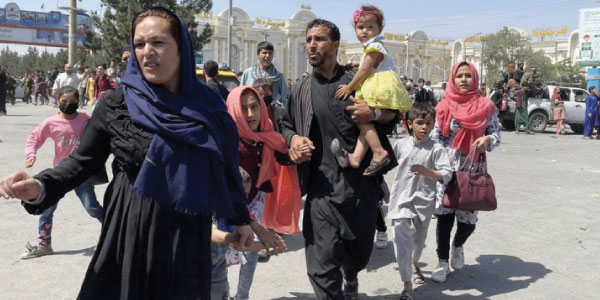
La retirada apresurada y mal planificada de Estados Unidos de las tropas estadounidenses de Afganistán ha desencadenado una evacuación caótica de ciudadanos extranjeros y afganos desesperados temerosos de los brutales yihadistas que han retomado el país. Junto con Estados Unidos, Australia, Egipto, Francia, Alemania, Italia, Nueva Zelanda y el Reino Unido están trabajando para evacuar a sus respectivos ciudadanos y a miles de afganos desesperados por escapar de los talibanes, que han tomado el control del país. Hasta el 22 de agosto, Estados Unidos había evacuado a 28,000 personas, según lo reportó el The New York Times. El domingo, el secretario de Defensa de Estados Unidos ordenó a seis aerolíneas comerciales que proporcionaran 18 aviones. El ejército especificó “aviones de largo recorrido y de cuerpo ancho capaces de transportar varios cientos de pasajeros”, según el New York Times. Son necesarios para transportar a estadounidenses evacuados y aliados afganos de Kabul. Y el lunes, Australia y Nueva Zelanda evacuaron a casi 700 australianos, neozelandeses y afganos.
El fin de semana pasado, varios afganos, incluido un niño pequeño, murieron pisoteados entre la multitud de personas desesperadas por ingresar al aeropuerto de Kabul, el único actualmente operativo en Afganistán. Buscaron frenéticamente un vuelo fuera del país. Más de 18,000 afganos han salido de Kabul desde el 15 de agosto, reportó el periódico británico en línea The Independent. Sin embargo, la Agencia de las Naciones Unidas para los Refugiados advirtió que la mayoría de los afganos “no tienen salida”; los que están en mayor peligro no pueden salir a través de “canales regulares”. Los talibanes, que quieren evitar que los afganos se vayan, controlan el aeropuerto y todos los principales puntos de cruce con los países vecinos. Pakistán, que ya tiene unos tres millones de afganos desplazados, está trabajando con Irán para prevenir otro “éxodo” de refugiados y solicitantes de asilo de Afganistán.
Los afganos que logran huir del brutal régimen que ahora controla Afganistán se enfrentan al espinoso problema de adónde ir. Unos relativamente pocos países les han dado la bienvenida. Entre esas naciones hospitalarias se encuentran Albania, Australia, Canadá, Chile, Colombia, Costa Rica, Ecuador, Alemania, Hungría, México, Qatar, Tayikistán, Uganda, Reino Unido y Uzbekistán. Hasta el lunes, la administración de Biden no había anunciado cuántos refugiados afganos aceptará Estados Unidos.
Además de aumentar la amenaza terrorista para Estados Unidos y nuestros aliados y poner en peligro la relativa estabilidad en la región, la retirada apresurada de las tropas estadounidenses ha desencadenado una crisis humanitaria en Afganistán. Los civiles estadounidenses y miles de afganos que trabajaron con Estados Unidos y sus aliados, las mujeres y niñas afganas, los periodistas, los abogados de derechos humanos y los activistas se esconden hasta que puedan escapar de Afganistán. Les aterrorizan los combatientes talibanes.
Todos los aspirantes a evacuados, civiles estadounidenses y nuestros aliados y afganos, especialmente las mujeres jóvenes y otras personas más expuestas a los talibanes, deben tener un pasaje seguro a un país que ofrezca refugio. De lo contrario, advirtió un trabajador humanitario estadounidense en Afganistán, “literalmente estaremos condenando a muerte a la gente”.
Desperate to escape
America’s poorly planned, hasty withdrawal of U.S. troops from Afghanistan has set off a chaotic evacuation of foreign nationals and desperate Afghans fearful of the brutal jihadists that have retaken the country. Along with the U.S., Australia, Egypt, France, Germany, Italy, New Zealand and the U.K. are each working to evacuate their respective citizens and thousands of Afghans desperate to escape the Taliban, which has seized control of the country. As of Aug. 22, the U.S. had evacuated 28,000 people, The New York Times reported. On Sunday, the U.S. Defense Secretary ordered six commercial airlines to provide 18 airliners. The military specified “wide-bodied, long-haul aircraft capable of carrying several hundred passengers,” according to The New York Times. They’re needed to transport evacuating Americans and Afghan allies from Kabul. And on Monday, Australia and New Zealand evacuated nearly 700 Australians, New Zealanders and Afghans.
Last weekend, several Afghans, including a toddler were trampled to death in the crush of people desperate to get into the airport in Kabul, the only one currently operational in Afghanistan. They frantically sought a flight out of the country. More than 18,000 Afghans have flown out of Kabul since Aug. 15, British online newspaper, The Independent reported. However, the United Nations Refugee Agency warned that most Afghans “have no way out;” those most in danger are unable to leave through “regular channels.” The Taliban, which wants to prevent Afghans from leaving, controls the airport and all the main crossing points with neighboring countries. Pakistan, which already has about three million displaced Afghans, is working with Iran to prevent another “exodus” of refugees and asylum seekers from Afghanistan.
Those Afghans who manage to flee the brutal regime now controlling Afghanistan face the thorny problem of where to go. A relatively few countries have put out the welcome mat for them. Among those hospitable nations are Albania, Australia, Canada, Chile, Colombia, Costa Rica, Ecuador, Germany, Hungary, Mexico, Qatar, Tajikistan, Uganda, the U.K. and Uzbekistan. As of Monday, the Biden administration hadn’t announced how many Afghan refugees the U.S. will take.
Besides raising the terrorist threat to the U.S. and our allies and jeopardizing the relative stability in the region, the hasty withdrawal of U.S. troops has touched off a humanitarian crisis in Afghanistan. American civilians and thousands of Afghans who worked with the U.S. and allies, Afghan women and girls, journalists, human rights lawyers and activists are in hiding until they can escape Afghanistan. They’re terrified of Taliban fighters.
All would-be evacuees – American civilians and our allies and Afghans, especially young women and others most at-risk from the Taliban – must be afforded safe passage to a country offering sanctuary. Otherwise, one American aid worker in Afghanistan warned, “we’ll literally be condemning people to death.”









